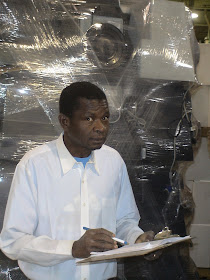Agriculture in developing worlds can mean starvation. There are a lot of things better than starvation. Perhaps they shouldn't have to make that choice. But they do.
There are not as many ways out. (World Bank: Informality & Productivity in the Labor Market in Peru)
Scrapping and repairing are not on the lists of Ju-ju professions. The strong concentration of scrappers in China and Africa is not a sign of exploitation. These are good people who are trying to thread a needle, who are trying to create wealth in the most honorable way they can. Scrap and repair is the road most travelled for the smartest kids in the slums.
They cannot all be taxi drivers, cooks, and teachers. There has to be a way to add value. Entire economies are supported on the multipliers from scrap and reuse. The money they bring in makes another career, like teaching or taxi driving, or pie baking possible.
 |
| Roll up the window, you're letting the air out |
- Bush meat, hunting of endangered species.
- Gold mining and gold panning, using mercury from USA's recycled lamps
- Cutting rain forests.
- Soldier.
- Sex worker.
- Kidnapper, pirate, and thief.
There are not as many ways out. (World Bank: Informality & Productivity in the Labor Market in Peru)
Scrapping and repairing are not on the lists of Ju-ju professions. The strong concentration of scrappers in China and Africa is not a sign of exploitation. These are good people who are trying to thread a needle, who are trying to create wealth in the most honorable way they can. Scrap and repair is the road most travelled for the smartest kids in the slums.
 |
| Jorge is still fixing TVs. Choma was not replaced. See them in action in the 2008 video below |
They cannot all be taxi drivers, cooks, and teachers. There has to be a way to add value. Entire economies are supported on the multipliers from scrap and reuse. The money they bring in makes another career, like teaching or taxi driving, or pie baking possible.















